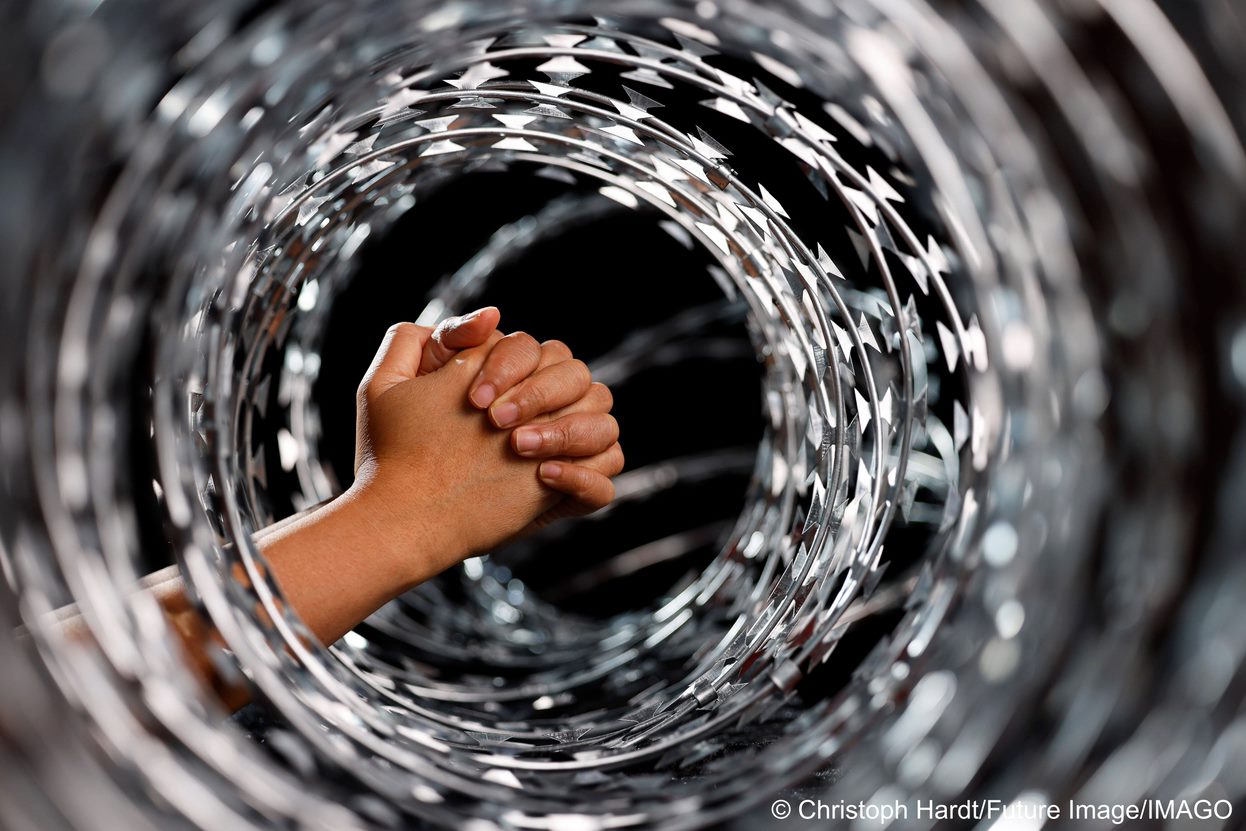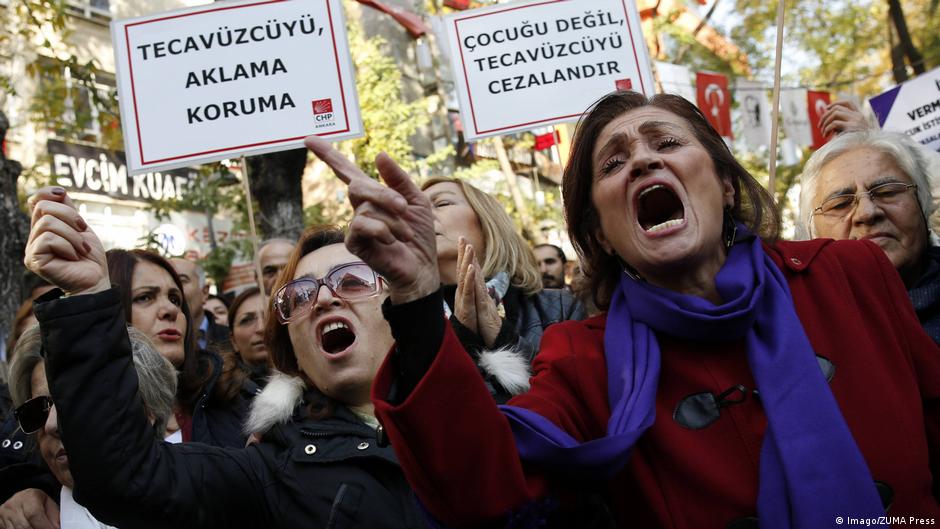Turkish state fails child bride in sect marriage

H.K.G. was married when she was only six. She was sexually abused, systematically and continuously, with the knowledge of the Hiranur Foundation, one of Turkey’s most powerful Islamic sects and authorities. Now 24, she is waging war on everyone who was complicit in the crime, including the sect and the judicial system that failed to protect her.
Her case has cast a spotlight on religious sects and the failure of the Turkish judicial system, unleashing a wave of public anger.
H.K.G., identified in media reports only by her initials, is the daughter of Yusuf Ziya Gumusel, head of the Istanbul-based foundation, which is affiliated to the influential Ismail Aga religious community. According to her testimony to the public prosecutor, she was married off by her father to one of his followers, 29-year-old Kadir Istekli, when she was just six.
A photo provided to the court shows she was dressed in a dress resembling a bridal gown. In her statement, H.K.G. reportedly said she was taken to the photo studio for a "wedding photoshoot". Istekli told her they were playing "a game everybody plays but does not talk about". Over the years to come, he sexually abused her.

She and Istekli lived in the same building with her family. Her parents sent her to his flat from time to time until she was 14. Thereafter, following a non-civil wedding ceremony, at which none of the attendees bothered either to pay any attention to her age or inform the authorities, she began living with Istekli in the same house.
Child marriage a punishable act
Turkey’s laws against child marriage have only begun improving fairly recently. In 2001, the legal age for marriage in Turkey was raised for both sexes to 18. Before 2001, girls could be married off in civil marriages at the age of 16 and young men at 17.
Marrying children off became a punishable act, yet it still takes place in Turkish society. Today, in Turkey, one in five women aged between 18 and 45 was married before turning 18, according to a study titled "Child, Early and Forced Marriage in Turkey: Data Analysis of Turkey Demographic and Health Surveys conducted between 1993 and 2018". The study was carried out by UNFPA Turkey and Hacettepe University Institute of Population Studies.
H.K.G. was never sent to school and was therefore not registered in the official education system, even though all children must attend school for 12 years, starting at the age of six.
When her claims were made public, Turkey's education and academic workers union Egitimsen accused the education ministry of not thoroughly monitoring children’s attendance in schools. The union reiterated that not sending children to school was punishable by law, but that there was a general atmosphere of impunity.According to the head of Egitimsen, Nejla Kurul, some 1.5 million girls do not attend school in Turkey. Kurul believes that had H.K.G. been going to school, she would have told her teachers about the abuse she was going through.
In 2012, months after she was married off in a non-civil wedding, she was taken to a doctor by her mother complaining of irregular periods. The examining physician realised she was being sexually abused and informed the police immediately.
Based on the doctor’s testimony, the prosecutor's office launched an investigation. Her family, however, coerced her into both giving her age as 17, not 15, and saying that she had got married of her own free will.
Authorities fail to follow through
As part of the investigation, she was required to submit to a bone age assessment. This was when the religious group her father headed up stepped in. They managed to get another woman, aged 21, to do the test, misleading the authorities. Once the authorities were informed that she was 21, the investigation was closed, despite hospital records clearly showing her to have been born in 1998 – as given on her birth certificate.

It was neither the first nor the last time that the system, which was supposed to offer protection, would fail her.
She gave birth when she was 17 and was finally legally married off in a civil wedding when she hit 18. Two years later, however, she began to realise that what she had experienced was not normal, but sexual abuse and rape. She began using social media secretly to record what she was really going through.
In 2020 she took refuge in a women's shelter, got divorced and started pursuing an education with the aim of obtaining her primary school diploma. She filed a complaint against her family and ex-husband. Despite all the evidence, however, it took two years for the public prosecutor’s office to prepare an indictment.
In December 2022, when the indictment was finally issued, Timur Soykan – a journalist with the left-leaning opposition newspaper Birgun – broke the news, detailing the indictment and allegations. The front-page story triggered massive public outrage, forcing the judicial authorities to finally take action.
With the scandal dominating the national news agenda, H.K.G.'s hearing was brought forward to 30 January. Her father, mother and ex-husband were arrested and the Health Ministry launched its own investigation into the doctors who were allegedly involved in the fraudulent bone age assessment. Turkey’s Board of Judges and Prosecutors (HSK) has announced a probe into the prosecutor who closed the first investigation.
Influence of religious sects in Turkey
The reports relating to H.K.G. triggered a long-running discussion in Turkey regarding the influence, power and outreach various Islamic sects have in politics and many spheres of life.
Seculars and critics believe that during the 20 years of the ruling Justice and Development Party’s (AKP) power, religious sects – known as "tariqat" in Turkish – have continued to expand their influence. Some argue it was they who pushed Turkey into withdrawing from the Istanbul Convention, a landmark international treaty protecting women against violence, in 2021.
But despite the public animosity and scepticism towards them, the tariqat persist in clinging to the power they have. Insufficient regulatory action by the government means they continue to exert considerable influence.
When news of H.K.G.'s case broke, Erdogan announced that marrying off children before they turn 18 was something of which he "did not approve".
"We will not allow our girls to be abused, nor will we turn a blind eye to our nation being humiliated by frenzy filled with grudge and hatred," he said.
Many orthodox Muslims claim this individual case is just a pretext to smear sects and Islam. Turkey's family and social services minister Derya Yanik also believes the case has nothing to do with the sect, saying on a TV programme that such issues are encountered in "every society" and are no concern of politics.
On 30 January, the entire country will be following H.K.G.'s trial, in the hope that – this time – she gets justice.
© Qantara.de 2023
